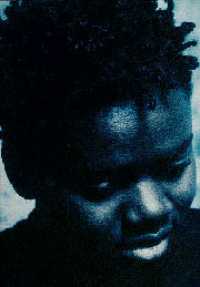Grammy winning singer-songwriter Tracy Chapman returns to the recording fold with a new album that's as notable for its soulful hearthside vibes as for its deep-felt songs. Co-produced by Chapman and celebrated sound engineer and mixer Tchad Blake (Los Lobos, Peter Gabriel, Pearl Jam, Tom Waits, Bonnie Raitt, Elvis Costello, Richard Thompson), Where You Live was recorded at an improvised San Francisco rehearsal space-turned-studio that inspired the singer and her accompanists to stretch out both musically and spiritually. The result is 11 original compositions complemented by some of the most intimate performances Chapman has ever captured. Running the stylistic gamut from hauntingly rendered ballads ("3,000 Miles," "Going Back"), to coarse-grained Americana ("Before Easter," "Taken," "America") and bright-burning acoustic rockers (the album's maiden single, "Change"), Where You Live is a remarkably intimate-sounding album that reestablishes Tracy Chapman as one of the premiere singer-songwriters of her time.
Though Chapman is hard pressed to trace the inspirational source of her new material, the singer discovered a common thread after Where You Live was completed. "All the songs seemed to reference this idea of where you live," Chapman explains. "In some songs, the reference is to a physical place and environment -- where you live physically in the world. In some of the other songs, the reference is to a state of mind; where you live in your head and in your heart. I'd say there's even a song or two that addresses how you think about yourself in relation to the universe. That's how the title of the record came to be."
With its memorable songs and true-to-life recording sounds, it seems inevitable that fans will embrace Where You Live with ardent enthusiasm. Chapman charts the album's musical course on the opening track, "Change." Built on a rock-steady folk rhythm, this compelling single finds Chapman posing timeless rhetorical questions that seem all the more relevant in this discordant age of affluence and poverty, war and peace, faith and science. To wit: "if you knew that you would die today / if you saw the face of God and love... would you change?"
With "Change" serving as a point of departure, Where You Live proceeds to transport listeners to an all-encompassing world of musical possibility. On the gorgeously rendered "Don't Dwell," Chapman frames bittersweet lyrics against ravishing torch song melodies. On "America," the singer ponders the escalating cost of western imperialism, setting her sentiments to driving rhythms that evoke the merciless lurch of progress. "Going Back" and "3,000 Miles," examines the struggle for identity in an increasingly dehumanized world, while tracks like "Talk to You" and "Love's Proof" follow in the romantic tradition of Tracy Chapman love songs like 1988's "Baby Can I Hold You" and 2002's "I Am Yours."
To underscore the album's truth-seeking lyricism, Chapman stripped away any sonic barriers that might impede the connection between artist and listener. Instead of booking time at a professional studio, the singer and co-producer Blake trucked recording gear into an unassuming Bay Area rehearsal space. The pair then invited a small but select group of musicians to join them, including guitarist / keyboardist Joe Gore (Tom Waits, PJ Harvey, Eels) and percussionist Quinn (eastmountainsouth). Legendary bassist Flea (Red Hot Chili Peppers) was recruited to play on three tracks, while Chapman herself ably handled vocals, guitar, keys and clarinet.
The fortunate result of these experiments is the spontaneous, on-the-fly sound that animates Where You Live. Far removed from the claustrophobic pop productions of the day, Chapman's new album boasts an airy, wide-open sound that complements the forthrightness of her songs. "I felt like simplifying things would give me the flexibility I was seeking," the singer explains. "Playing with just a few musicians would give me the ability to do what I do when I play acoustic -- that is, to give an interpretation of a song that's for the moment, or a particular place. To me, it feels like this approach creates an opportunity for more emotion."
Just shy of her 20th anniversary as a recording artist, it's heartening to find Tracy Chapman still in hot pursuit of "more emotion." After all, it was Chapman who brought the metal-weary masses to their senses in 1988 with her self-titled debut album. Fueled by the success of the singles "Fast Car," "Talkin' Bout A Revolution" and "Baby Can I Hold You," Chapman's album went on to sell 6 million copies domestically and captured three Grammy awards, including Best Female Pop Vocal Performance, Best Contemporary Folk Recording and Best New Artist. She was named Best New Artist (Pop / Rock) at the 1989 American Music Awards and was featured on the Amnesty International Human Rights Now! World tour with Peter Gabriel, Bruce Springsteen, Sting and Youssou N'Dour.
Impervious to trends, Chapman has commendably stayed her musical course, winning acclaim for such albums as "Crossroads" (1989 -- certified platinum), "Matters of the Heart" (1992 -- certified gold)," "New Beginning" (1995 -- 5x platinum), "Telling Stories" (2000 -- gold) and "Let It Rain" (2002). The singer's incandescent recordings have continued to win the approbation of fans, critics and peers. "Give Me One Reason," the bluesy single from "New Beginning," netted Chapman her fourth Grammy.
Now, with the release of her new album, Tracy Chapman continues on the strong-willed path that has made her one the world's most acclaimed singer-songwriters. Where You Live possesses an aural integrity and nuanced emotionalism rarely evidenced in contemporary pop music.
"It's a very 'vibey' record," the singer says, laughing at her own coinage. "In some way, the sound of this album manages to convey the mood and tone of the (recording sessions), and I'm thrilled about that. This absolutely has been one of the best experiences I've had making a record. I'm ecstatic."
Source: http://www.tracychapman.tk
